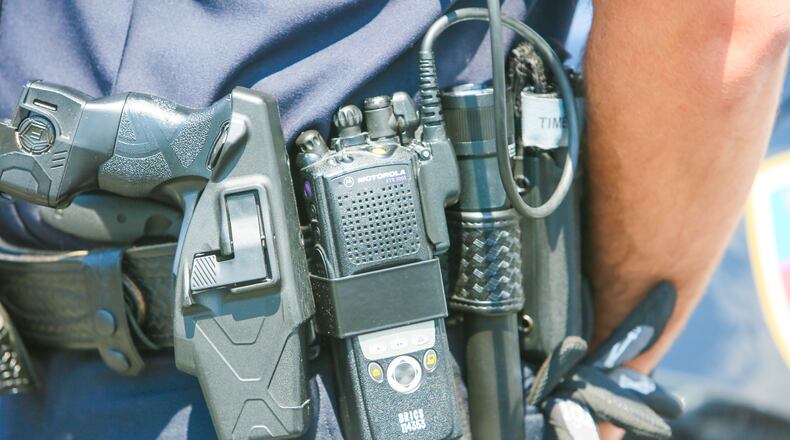“What we learned was that most of the chiefs and city managers, folks like that we’re dealing with now, weren’t here 10 years ago,” Franke said. “They’re not the ones who signed the participation agreement or processed it.”
In 2005 the county commissioners approved a temporary sales tax levy to upgrade the county’s communications system. But now Motorola, the provider of Butler County’s equipment, doesn’t make the radios anymore. And beginning in 2019, won’t service them. Local jurisdictions are responsible for replacing their own radios.
RELATED: Should taxpayers be on the hook for $19.2 million radio replacement?
Several elected officials were caught off guard recently when news of the expensive replacement surfaced. County Administrator Charlie Young said he asked the sheriff to hold off as long as possible on the replacement.
It seemed everyone needed to budget replacements next year. Young said that may not be the case.
“The sheriff has worked out a financing plan where the payments would then be started in 2019 and would run for two or three or five years, whatever makes sense,” Young said. “The county can either pursue that financing scheme or find some other way to pay for it.”
MORE: Butler County budget a challenge for 2018
Even with the possibility of a payment plan some jurisdictions, like Oxford, are saying they will wait. Oxford Fire Chief John Detherage, who is president of the Butler County Fire Chiefs’ Association, said they have found at least two vendors who say they have access to parts and will be able to service the Motorola machines.
Couple that with the fact the sheriff’s 543 will be on the market after he replaces his equipment. Most public safety officials have said the radios are very durable and they don’t have many problems with them. Detherage said he can’t see spending $451,000 — money the city doesn’t have — for new fire and police radios.
“I’m usually the guy that wants to do it early and get it as cheap as we can,” he said. “I just don’t have that kind of money. I’ve got too many other things I need that money to go to, I need people worse than I need radios. I’ve got radios that work.”
West Chester Twp is another place that said they will replace the radios as they break. A report by Franke shows there were 2,248 in-house repairs on the radios since 2010 and 286 that had to be sent to Motorola for more advanced attention.
RELATED: County won’t borrow or increase taxes for communications equipment
Other communities are still up in the air on the direction they will take. Middletown is looking at around $1 million to replace their 167 fire and police radios. Middletown Fire Chief Paul Lolli said they are researching to see if there are other manufacturers who have more affordable equipment.
“I think we would look at other manufacturers, not only Motorola,” Lolli said. “We would see if there would be other radios that would be just as reliable as the Motorolas but maybe more financially conducive for our needs.”
Both Lolli and Hamilton Fire Chief Steve Dawson expressed concern that they learned yesterday the county has been selling 400 batteries a year to the various jurisdictions and they are becoming harder to find.
“One of the most critical factors is finding replacement batteries for the current ones,” Dawson said. “Intrinsically safe batteries, batteries basically which are safe to use in explosive gas, and a combustible atmosphere.”
Dawson said they need to have some long conversations on this $1 million issue as they struggle to find the best course of action.
The county has negotiated a bulk discount rate with Motorola at $4,033 for fire radios and $3,973 for police for a total of $12.5 million. Replacing the infrastructure will cost $6.8 million but that is all on the county’s dime. There have been discussions with the data and communications equipment giant about keeping the bulk price open for a period of time, so smaller jurisdictions can manage the cost.
In Monroe, under the current discount rate, the city would have a $340,405 replacement bill. Fire Chief John Centers said he and Police Chief Bob Buchanan are taking a wait and see approach.
“We’re going to ride this out for a little while and see what happens with it,” Centers said. “When they get everything finalized with Motorola and determined if there is a period of time that they’ll hold a bulk price, we’ll probably go back to the drawing board and see where that puts us from a budget standpoint.”
MORE: Butler County continues to explore options for $19.2 million equipment bill
Fairfield appears to be the only jurisdiction that has budgeted for the radios.
Young said they understand their bulk rate could be in jeopardy if too many other jurisdictions opt out of the purchase and they are continuing to negotiate with Motorola.
“The fewer radios the less discount would be received, which would drive the county’s cost up,” Young said. “We’re just going to have to work through the problem and figure out how to make it happen.”
Franke said his take away from the meeting was that everyone is viewing this as a joint problem to be solved together.
“I think there was a consensus that they want to work together for an immediate solution and hopefully a permanent solution to this that will carry on into the future,” he said. “Somebody said the worst thing that can happen is we end up here 10 years from now with the same problem.”
About the Author
